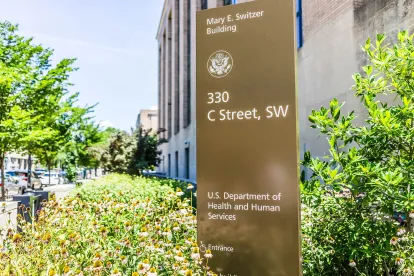Highlights
-
The Health and Human Services’ Office of Inspector General declined to impose administrative sanctions on healthcare provider marketplace offering advertising services to providers
-
The agency highlighted transparency measures, user-centric algorithms, and careful approach to use by government healthcare program beneficiaries as reducing the risk of fraud and abuse
-
The HHS-OIG’s favorable opinion demonstrates its continued leniency when analyzing arrangements that improve public health
On July 6, 2023, the U.S. Department of Health and Human Services’ Office of Inspector General (HHS-OIG) issued Advisory Opinion No. 23-04 declining to impose sanctions against a technology company operating an online marketplace on which individuals, regardless of insurance status, can search for and book appointments with providers who contract to be listed on the marketplace.
Despite potential implications under the federal Anti-Kickback Statute (AKS) and the beneficiary inducement civil monetary penalty rules, the HHS-OIG determined that the marketplace’s fee structure, search algorithm, limited nature of advertising services, broad user base, approach to federal health program beneficiary use, and transparency safeguards sufficiently limit the risk for fraud and abuse presented by the services provided.
The marketplace offers a platform through its website and mobile application allowing users to search for providers using criteria such as services offered, geographic area, available appointment times, and insurance accepted. The search results list provider profiles by name, but do not advertise any specific items or services. Again, this information is available to the general public no matter what their insurance status.
Providers pay a per-booking fee for each new patient they receive through the marketplace. Fees vary based on the provider’s medical specialty, geographic location, and other relevant factors that could influence the fair market value of the marketing service provided. Fees do not vary based on the likelihood that the provider will receive referrals for government healthcare program beneficiaries through the marketplace.
The marketplace allows providers to set spending caps, which temporarily removes them from marketplace searches once they have incurred a certain amount of booking fees. Spend-capped providers remain visible to government healthcare program beneficiaries and users who do not disclose their insurance, or “non-commercial users”. Users visiting a spend-capped provider’s profile cannot book an appointment through the marketplace. However, users are informed that the provider’s profile may not reflect their full availability and that additional appointments may be made by contacting the provider directly. Non-commercial users can also schedule alerts through the marketplace that notify them when a spend-capped provider begins accepting appointments through the marketplace again.
The marketplace algorithm uses machine learning to determine user preferences based on over 180 different criteria. It does not place a fixed weight on any given criterion, but learns over time that users with certain needs and preferences engage with providers that have certain characteristics. The algorithm uses this information to match patients and providers accordingly. For non-commercial users, the algorithm does not filter or prioritize providers based on fees paid, use of spending caps, volume or value of business from government healthcare program beneficiaries, or any other criteria that is not “user-centric.”
Providers may also purchase banner advertisements referred to as “sponsored results” that are displayed at the top or on the sides of marketplace search results and on third-party websites. Sponsored results advertise certain provider profiles but do not offer any specific items or services. These advertisements appear for all users and do not specifically target federal healthcare program beneficiaries. The results are clearly labeled as sponsored results and are readily distinguishable from marketplace search results. Advertisements may be purchased on a “per-click” or “per-engagement” basis with fees determined by a bidding process allowing providers to bid for a certain advertisement that will appear when a user searches for certain keywords.
Although the HHS-OIG found that the marketplace implicated both the AKS and beneficiary inducement civil monetary penalty rules, the agency concluded it did not pose a significant risk of fraud and abuse and declined to impose sanctions on the company for several reasons, including:
-
Providers do not receive more frequent appearances or favorable placements in search results based on the amount of fees they pay
-
The company operating the marketplace is not a provider or supplier of any medical items or services
-
The advertising services offered by the marketplace do not specifically target non-commercial users
-
The marketing services do not relate to any specific items or services
-
The marketplace’s potential user base is the general public and not only non-commercial users
-
Changes to the marketplace would include spend-capped providers in searches performed by non-commercial users and include other transparency measures such as indicating that the spend-capped provider may have additional availability if contacted directly
-
The algorithm used to prioritize marketplace search results does not consider the amount that providers pay to the marketplace, use of spending caps, or business generated by referrals of non-commercial users.
The HHS-OIG noted that the marketplace does not provide anything of value to federal healthcare program beneficiaries, which significantly limits the likelihood that any would be induced to select one provider over another.
The HHS-OIG’s favorable opinion relies largely on the fact that the marketplace ensures that federal government healthcare program beneficiaries are not excluded from seeing certain providers on anything other than the user’s preference. By ensuring that all providers, even those that restrict the fees they pay, have access to non-commercial users, the HHS-OIG concluded the risk of fraud and abuse created by the arrangement was limited.
Key Takeaways
The HHS-OIG’s favorable opinion demonstrates its continued leniency when analyzing arrangements that improve public health and offer little risk of increased costs to the federal healthcare programs. This opinion is consistent with earlier 2023 advisory opinions, showing that the HHS-OIG has exercised discretion when evaluating arrangements that could lead to a positive impact on public health.






 />i
/>i

